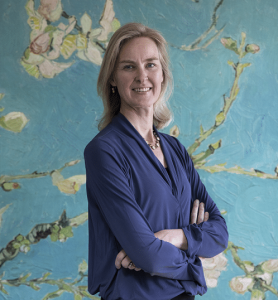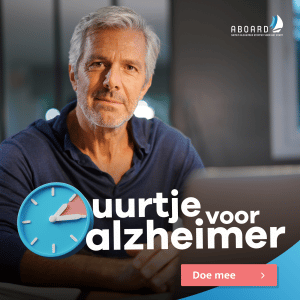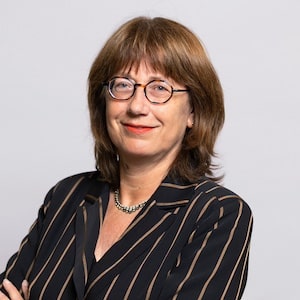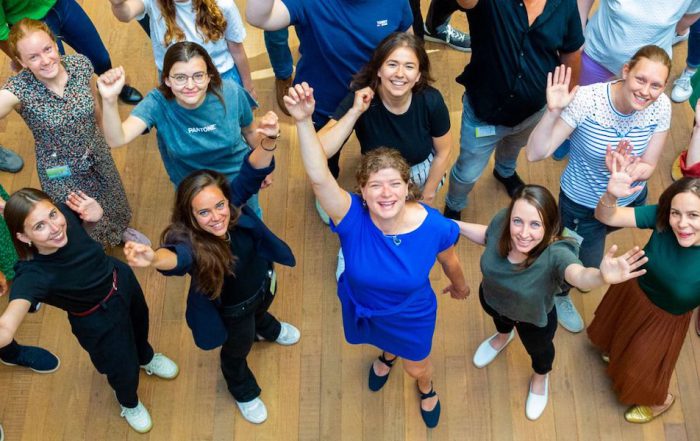All ABOARD: samenwerken en Alzheimer stoppen
Alzheimer 'stoppen voordat het begint' is het doel van ABOARD, een zeer ambitieus landelijk samenwerkingsverband van meer dan 30 zorgpartners in Nederland. Om dat doel te bereiken zijn communicatie, publiek-private samenwerking en data nodig. Veel data, verstrekt door het publiek en toegankelijk voor meerdere onderzoekers via een geïntegreerde infrastructuur.
Momenteel leven wereldwijd naar schatting 55 miljoen mensen met dementie en dit aantal zal volgens Alzheimer’s Disease International stijgen tot 139 miljoen in 2050.

Wiesje van der Flier
Wiesje van der Flier, wetenschappelijk directeur van het Alzheimercentrum Amsterdam van het Amsterdam UMC, leidt ABOARD. Het project werd geïnspireerd door haar observatie van de vooruitgang die wordt geboekt in het begrip van veel verschillende aspecten van de ziekte van Alzheimer. “Deze variëren van fundamentele nieuwe inzichten, bijvoorbeeld in de genetica, tot toegepaste praktijken,” zegt zij. “Ik realiseerde me dat deze veranderingen zo groot zijn dat niemand dit alleen kan – we moeten echt samenwerken.” Het duurde niet lang voordat Van der Flier ontdekte dat haar visie van een grootschalig onderzoeksproject uitgevoerd door een nationaal multidisciplinair consortium door vele anderen werd gedeeld. “Ik had een ruw plan en begon rond te bellen om te zien wie zich zou willen aansluiten. Toen realiseerde ik me dat we echt een publiek-privaat partnerschap nodig hadden, met niet alleen de academische centra en de ziekenhuizen, maar ook bedrijven en burgers. Iedereen die ik belde zei: “Ja, ik doe mee, want dit is echt belangrijk. Uiteindelijk had ik meer dan 30 partners.”
Lange reis naar dementie
Het motto van het ABOARD-project is ‘Alzheimer stoppen voordat het begint.’ Geen onmogelijke droom, aldus Van der Flier. “Wat we door jarenlang onderzoek hebben geleerd, is dat de ziekte van Alzheimer zich in de loop van 20 tot 30 jaar ontwikkelt, voordat er uiteindelijk sprake is van dementie,” legt ze uit. “Dus wat we willen doen is de hersenpathologie stoppen, de ziekte stoppen. Alzheimer stoppen voordat de dementie begint.” De vier pijlers van de ABOARD-benadering zijn diagnose, voorspelling, preventie en patiëntgerichte zorg. De aanpak is gebaseerd op inzicht in de reis van de patiënt, aldus Van der Flier. “We moeten ervoor zorgen dat we een nauwkeurige en vroege diagnose kunnen stellen. En als we die vroege diagnose hebben, moeten we ervoor zorgen dat we kunnen voorspellen wat er met iemand in zijn ziektetraject zal gebeuren. Dan moeten we weten wat het beste werkt voor individuele patiënten en welke combinatie van levensstijl en medicatie effectief zal zijn.” De vierde pijler, patiëntgerichte zorg, biedt patiënten en hun familie de best mogelijke ondersteuning en zet patiënten “aan het stuurwiel van hun eigen gezondheidszorg, hun eigen ziektebeheer”.
Vruchtbare samenwerking
Het project, met een looptijd van vijf jaar, is in april 2021 van start gegaan en heeft op verschillende fronten vooruitgang geboekt. De ontdekking van specifieke biomarkers en een aantal nieuwe genen houdt een belofte in voor vroegtijdige diagnose en voorspelling. De wereldwijde ontwikkelingen op het gebied van leefstijlinterventies en geneesmiddelen gaan snel. Maatregelen om patiënten en hun familie er beter bij te betrekken werpen hun vruchten af.
Het consortium werkt aan een groot aantal onderwerpen, met in totaal 35 afzonderlijke taken. Een van de redenen waarom het goed functioneert is dat elke partner zich richt op het specifieke aspect van Alzheimer waarin hij deskundig is. De samenwerking zelf is volgens Van der Flier een van de grootste prestaties van ABOARD tot nu toe: “We trekken echt samen op als netwerk, praten samen, weten elkaar te vinden. We bouwen ook aan een nieuwe generatie jonge onderzoekers en jonge professionals die dit in de toekomst moeten gaan doen. En dat is heel bijzonder.”
In verbinding blijven
Van der Flier is ook zeer enthousiast over het publiek-private karakter van het project. “Het geeft veel voldoening,” zegt ze. “Als je in een academische setting werkt, wil je uiteindelijk dat je onderzoek ten goede komt aan de samenleving. Daarom is het heel belangrijk om samen te werken met maatschappelijke partners, met bedrijven. Zij kunnen de resultaten opschalen en maatschappelijke partners weten wat er echt speelt in de samenleving.” Natuurlijk zijn er uitdagingen bij het werken in zo’n groot consortium met partners die elk hun eigen agenda en hun eigen mening hebben. Communicatie is hier de sleutel, zegt Van der Flier. “De formele samenwerking is allemaal vastgelegd in de consortiumovereenkomsten, waar alle partners zich aan moeten houden. Maar in de dagelijkse praktijk gaat het om communicatie: verbonden blijven en weten wat je kunt bijdragen aan het project en wat je eruit wilt halen.”
‘We lopen allemaal gevaar’
 Zoals alle grote onderzoeksprojecten is ABOARD afhankelijk van grote data sets, en om deze te genereren is het ABOARD-cohort opgezet. Het is de bedoeling zoveel mogelijk mensen te werven voor een studie om de progressie van de ziekte van Alzheimer te begrijpen. Het publiek kan zich op de website inschrijven en gezondheidswerkers kunnen rechtstreeks contact opnemen om te weten te komen hoe zij kunnen deelnemen.
Zoals alle grote onderzoeksprojecten is ABOARD afhankelijk van grote data sets, en om deze te genereren is het ABOARD-cohort opgezet. Het is de bedoeling zoveel mogelijk mensen te werven voor een studie om de progressie van de ziekte van Alzheimer te begrijpen. Het publiek kan zich op de website inschrijven en gezondheidswerkers kunnen rechtstreeks contact opnemen om te weten te komen hoe zij kunnen deelnemen.
Zoals Van der Flier uitlegt: “Ouder worden is de grootste risicofactor voor Alzheimer, dus we lopen allemaal risico. Ik ben geïnteresseerd in iedere Nederlander boven een bepaalde leeftijd om meer te weten te komen over de ziektetrajecten.” Het cohort verloopt volledig online, iets wat volgens Van der Flier het proces sterk vereenvoudigt: “Normaal gesproken, als je landelijk wilt werven, heb je een multi-centre studie met veel betrokken ziekenhuizen, en het is heel moeilijk om dat geregeld te krijgen. Online organiseren met een direct-to-participant strategie betekent minder gedoe en minder werk voor zorgprofessionals die hun patiënten willen laten bijdragen aan onderzoek.”
De openstelling van de studie voor iedereen via een online registratiesysteem vereenvoudigt niet alleen de aanwerving, maar maakt ook een bredere en dus meer diverse database mogelijk. “De meeste onderzoeken zijn gebaseerd op geselecteerde cohorten,” zegt Van der Flier, “dus je moet je afvragen of de voorspellingsmodellen ook opgaan voor de algemene bevolking.”
Deelnemers aan het cohort vullen jaarlijks een vragenlijst in over hun lichamelijke en geestelijke gezondheid, levensstijl en gebruik van gezondheidszorg. Zij worden ook gevraagd om toestemming te geven voor toegang van onderzoekers tot relevante klinische gegevens van hun zorgverlener(s) en/of zorgverzekeraar.
Katalysator voor verandering
Wanneer die toestemming is gegeven, bestaat de uitdaging erin de data van de verschillende partijen te verzamelen en toegankelijk te maken voor onderzoekers. Van der Flier kijkt naar het initiatief Gezondheidsdata Infrastructuur (GDI) als een manier om die uitdaging aan te gaan. In dit initiatief werkt Amsterdam Economic Board samen met Amsterdamse universiteiten, onderzoeksinstellingen, medische centra en de gemeente Amsterdam aan een geïntegreerde infrastructuur die data en inzichten beschikbaar stelt aan onderzoekers en zorgprofessionals. Van der Flier noemt het een “enorm belangrijk” initiatief, want “een van de knelpunten is het vinden van voldoende onderzoeksdeelnemers. Uiteindelijk kunnen we alleen vooruitgang boeken als burgers, patiënten, ons helpen door hun data te delen. We willen kunnen opschalen. Extrapoleren en valideren in een grootschalige setting, specifieke studies met elkaar verbinden, zodat of je nu meedoet aan een onderzoek in Rotterdam of Maastricht of Amsterdam, je ook wordt meegenomen in dit overkoepelende onderzoek.”
Zij gelooft dat de Gezondheidsdata Infrastructuur een katalysator kan zijn voor het beschikbaar stellen van data van individuen en zorgorganisaties voor onderzoek. “Het helpt door ziekenhuizen te koppelen en hun gegevens op de beste manier te extraheren, ze juridisch en vanuit een databankperspectief te organiseren, de zaken goed te regelen en soepel te laten werken en de privacy te beschermen. En dat is natuurlijk heel uitdagend vanwege alle verschillende organisaties en IT-systemen.”
Een uitmuntend land
Amsterdam is een uitstekende uitvalsbasis voor dergelijke grootschalige publiek-private samenwerkingen, zegt Van Der Flier. “Amsterdam heeft het allemaal. De universiteiten, de academische ziekenhuizen, veel goede zorgverleners, maatschappelijke organisaties, bedrijven.” En ABOARD trekt ook belangstelling van buiten Nederland, waarvan de Nederlandse regering volgens haar zou kunnen profiteren. “Ik hoop dat het ministerie van Volksgezondheid en het ministerie van Economische Zaken het project gebruiken om Nederland als interessant land onder de aandacht te brengen en ons te positioneren als topland op het gebied van dementieonderzoek en gezondheidszorg.”
Speel jouw rol
Het succes van ABOARD leunt sterk op grootschalige deelname. Het publiek kan deelnemen door zich online in te schrijven en de vragenlijsten in te vullen. Beroepsbeoefenaren in de gezondheidszorg worden uitgenodigd rechtstreeks contact op te nemen met het ABOARD cohort voor hulp bij het betrekken van hun patiënten.
Amsterdam UMC is partner van ons initiatief Smart Health Amsterdam en lid van de Amsterdam AI coalitie, een unieke samenwerking tussen Amsterdamse kennisinstellingen, onderzoeks- en medische centra, de gemeente Amsterdam en Amsterdam Economic Board. Deze coalitie richt zich op de ontwikkeling en toepassing van verantwoorde Kunstmatige Intelligentie, door de kracht van AI te combineren met een mensgerichte aanpak.
22 februari 2023
Meer weten over
Neem contact op
Blijf jij ook op de hoogte?
8x per jaar nieuws en events uit de regio: schrijf je in voor de Board Update nieuwsbrief
Deel dit artikel
Wil je op de hoogte blijven?
Volg ons dagelijks op LinkedIn en schrijf je in voor de Board Update nieuwsbrief.
Lees ook deze berichten
- Met de selectie van vier kanshebbers is de regionale voorronde van de ...
- Met meer dan 80 ondernemers, 40 investeerders en diverse dienstverleners bood LSH Capital Match ...
- In tijden van geopolitieke spanningen, technologische revoluties en politieke onzekerheden is het ...




